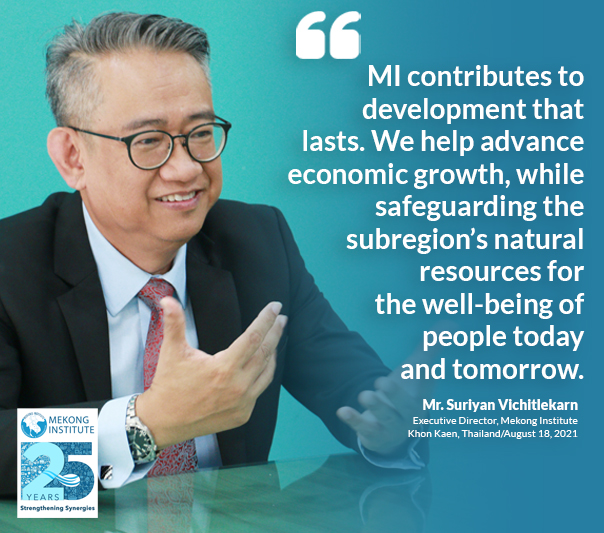“Mekong Institute (MI) is vested in doing development that lasts. We are committed in advancing economic growth, while safeguarding the subregion’s natural resources for the well-being of people today and tomorrow.”
This was the driving message of Mr. Suriyan Vichitlekarn, MI Executive Director, at the International Symposium on Ecosystem Restoration for Green and Peace Asia on August 18, 2021.
As a key speaker of the event, he advocated the need for increased capacity development investments to further mainstream social and environmental safeguards for more impactful development projects in Mekong countries.
He explained that surges in economic activities and population have placed escalating pressure on resources in the subregion, where around 322 million people rely on for their food, water, energy, and income. Compounding the strain are increasing weather variabilities, more frequent and severe weather events, as well as the degradation of biodiversity and ecosystem services.
The way forward to protect our natural assets is green growth, which is a priority in the Mekong subregion,
Mr. Suriyan said.
He added that embedding sustainable environment principles and practices in policies, strategies, and implementation rest on a holistic capacity enhancing approach where all stakeholders are involved.
With the launch of MI’s Sustainable Energy and Environment Department in January 2021, MI has been deploying trainings and policy dialogues, as well as linking multisectoral partners to bridge more knowledge-based policies and actions that will support the shift to resilient and green economies.
In addition, as Fund Manager of the Mekong-Republic of Korea Cooperation Fund since 2013, MI has been overseeing the management of 26 projects in the subregion, seven of which are focused on establishing environmentally sound infrastructure and facilities. MI has also been tapping its wide regional networks to strengthen green growth development by advocating for deeper synergies among partners to deliver more impactful results.
The symposium was hosted by the Korean Society of Forest Science and the Institutes of Green Bio Science and Technology at the Seoul National University.








